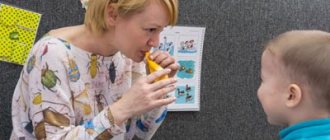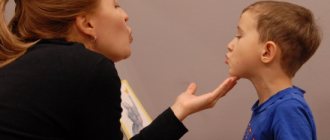Young children distort the pronunciation of words, distort them in different ways, and until a certain age this is normal. It can be difficult for unprepared parents to distinguish a normal variant from a speech defect.
Problems with speech lead to a lag in general development, because speech is its basis. It’s not uncommon for parents to realize that it’s time to run to a speech therapist only after talking with a kindergarten teacher or a primary school teacher. The article suggests several ways to understand whether a child needs a speech therapist, or whether the imperfections in his speech will go away as he grows up.
What speech defects require special attention?
Speech and language development is influenced by a number of factors, including physical maturity, heredity and environment. Hearing problems are a common cause of pronunciation problems, but even children with normal hearing may suffer from articulation problems or problems.
Below are the three most common defects among younger preschoolers when the child needs a speech therapist. They should alert attentive parents, but most often go unnoticed, since they are mistaken for the usual childish distortion of words and pronunciation.
To make it easier to monitor speech development, speech therapists recommend a convenient and simple diary, where you should write down all the baby’s new words. You can download this questionnaire, fill it out and continue further. Be sure to take it with you to your appointment with a specialist - with its help you can quickly form a general impression of your child’s speech skills
Stuttering or logoneurosis
At the age of 2-3 years, children often stutter at the beginning of a sentence. This phenomenon may take the form of repeating the first sound or syllable in a word or the first word in a sentence. More often it happens when the baby is tired, excited or in a competitive situation, such as when he strives to prove himself better or faster than his peers.
Lisp
A lisp is another common articulation problem when young children learn to speak. Preschoolers, as a rule, replace a sound that is easy to pronounce with one that is more difficult for them.
Long pauses
Another disadvantage is the appearance of too long pauses between words or thoughts. This is a sign of searching for the right word or thinking about how to structure your next sentence.
Speech training games
Those who have dexterous, sensitive fingers have well-developed speech. The following games will help develop fine motor skills:
► Pour peas into one box and beans into another, place them on opposite sides of the child and invite him to simultaneously put the cereal into a common pan. By the age of 3–4 years, a normally developing child’s actions should be coordinated.
► Hide a small toy in a pot of cereal - let the child dig through the cereal, looking for a car or a baby doll and thus developing tactile sensations. Or you can put the toy in a bag so that the baby can guess by touch what mom hid there.
This is how we train visual memory.
► Draw a picture for your child with lots of details. A house with windows, one has a curtain, the other does not. To the right of the house there are spruce trees, to the left there are apple trees. Smoke is coming from the chimney. In the left corner there is the sun, in the right corner there are birds... Let him redraw this picture exactly. It is not so important how well everything is drawn, it is important how accurately. If the child switched the trees or did not see the curtains, it means that he does not notice the details and his visual perception is impaired.
Now let's train our auditory memory.
► Can your child distinguish everyday noises? Try to see if he can, without looking, by hearing, determine what sound is being made: a running mixer, a closing refrigerator door, a match striking a box...
And for the child to relate himself in space...
► Constantly check with him: what is behind you, what is to your left, what is above you... What if you turn in the other direction?
Don't expect instant results. You will have to do these exercises dozens of times before your speech improves.
What parents can do besides contacting a speech therapist
In the early stages of stuttering, parents should do whatever is necessary to create a calmer environment in which they can express themselves without anxiety. Doctors still don't have a clear answer about why children stutter, but there are things parents can do to ease the problem. Here are three ways:
- Reduce stress. Although it is unclear why children stutter, it is known that emotional stress is significantly associated with stuttering, as is a family history of the disorder. Avoid putting pressure on your little one to speed up their language skills or correct their deficiencies.
- Read as much as possible. The best way to help develop language skills is to read fairy tales, stories and rhymes that are clear and easy to understand. Research shows that children who are read to regularly can develop meaningful language—saying their first real words—earlier and more effectively. Be sure to point to a picture in the book—a car, a ball, or a dog—and say those words clearly.
- Have lunch with the whole family. Research shows that in families that eat meals together, children have better oral skills. Perhaps through regular participation in conversation with adults, they will learn many new words and correct ways to form sentences.
Who has the vocabulary?
The speech therapist not only “produces” sounds, he checks the child’s overall development, looks at what kind of vocabulary the child has, whether he has good auditory and visual memory... Does he know how to correctly construct sentences, modify words, use prepositions...
By the age of 6, a child should know all the variety of household items: dishes, furniture, clothes... Unfortunately, today, almost a first-grader may hear words like “colander” or “sarafan” for the first time from a speech therapist. It’s good when there is a grandmother in the family who reads fairy tales and switches from an action movie to a domestic cartoon. But even overly busy dads and moms can find moments to talk with their baby. Just while you are cooking borscht, changing a tire on your car, working on the computer, explain to him what you are doing.
If new words are difficult to remember, if the child is not able to learn a single poem, this is also a reason to contact a speech therapist.
Three years is the age of why. But children who do not remember well are little interested in what is happening around them, rarely ask questions and usually immediately forget the answers. A child's lack of curiosity is an alarming symptom. Speech pathology is closely related to neurological problems, and poor memory can be caused not by developmental features, but by neurological diseases that arose due to a complicated mother's pregnancy or difficult childbirth.
By the age of 5, a child should be able to correctly agree words in gender and number, and by the age of 6, in case. He must be able to form and modify words, make sentences, use prepositions correctly and not confuse them.
Before going to school, you need to clearly know where “right” is, where “left” is, what “yesterday” is and what “tomorrow” is. Ignorance of such things indicates that the child has impaired visual and temporal perception.
So, in fact, all children benefit from visiting a speech therapist before going to school. A specialist will look at whether your child’s development is appropriate for his age and will tell you what you need to pay attention to and how you and your baby should deal with it before school.
Bilingual children (bilinguals)
Many children nowadays grow up learning two languages. Mixing vocabulary from two languages, making more grammatical errors and having a relatively small vocabulary in speech are all common behaviors in children in the early stages of learning two languages simultaneously.
However, deficiencies usually disappear over time on their own. These normal characteristics are sometimes mistaken by pediatricians for speech delays. So make sure your pediatrician knows that your bilingual child is learning two languages at once if you are referred to a speech-language pathologist.
Speech therapist work in kindergarten and school
“Every year the percentage of children who need speech therapy help is growing,” the expert notes. “And the later the defect is discovered, the more serious negative consequences it can have for the child’s development. Therefore, the task of a specialist working in a kindergarten is to promptly identify and prevent speech disorders in children of senior preschool age.”
In kindergartens, specialists are responsible for the development of coherent speech skills in children and the complete formation of its sound side. In other words, they teach children to hear and perceive sounds correctly, and then reproduce them correctly. They work with children individually and in groups.
In ordinary kindergartens, attention is paid only to those children who require professional help. And in specialized institutions and groups with a speech therapy focus, they are responsible for the entire educational process, building it in such a way as to help children get rid of speech problems as early as possible.
Be sure to involve parents in the work, provide consultation, and recommend correction techniques that can be used at home. If the speech therapist believes that the cause of the defect is a disease, he will recommend that the parents show the baby to a doctor - a specialized specialist. This approach helps eliminate the disorder at an early age or minimize its negative impact on the child’s development and speech.
Specialty "teacher-speech therapist"
In schools with children who are not doing well with speech, speech therapists work. Their task does not change, but it becomes more important. If a child does not perceive sounds correctly, he will usually have problems with literacy and writing. It is more difficult for him to study, remember material, and concentrate on the teacher’s words. Without correctional support, the school curriculum becomes an insurmountable obstacle for him, so it is imperative to correct violations with the help of a specialist.
“The tasks of a speech therapist at school are to promptly identify and correct speech disorders in students,” explains Vita Bilukha. “This helps to overcome difficulties that a child may have during the learning process.”
pixabay.com/
Specialty "defectologist-speech therapist"
Among speech therapists, there is a separate group of professionals who work with “special” children: toddlers and schoolchildren with intellectual disabilities. Such specialists are called defectologists: their qualifications allow them to correct defects in speech, writing, and communication skills in children with disabilities in physical and mental development.
Parents of children who have hearing and vision problems, developmental delays, memory and attention disorders, autism and cerebral palsy, and mental retardation turn to such specialists. A defectologist, of course, is not able to rid a child of the cause of the disease, however, thanks to correctional assistance, it is possible to improve the speaking and pronunciation skills of “special” children and help them communicate with loved ones and peers.
In his work, a defectologist closely interacts with doctors who “manage” the child: a pediatrician, a neuropsychiatrist. In specialized institutions, a defectologist, psychologist, and social teacher work with children at the same time. The tasks of specialists vary, but they have the same goal - to improve the quality of life of the patient under their care.
Simple physiological problems
Speech deficiencies in preschoolers are usually not serious. Most children with pronunciation problems learn the correct sounds by the early school years, when they have better control of the muscles involved in speaking. Various rhymes and tongue twisters help here well. Thus, speech therapists advise reading the longest tongue twister in Russian, “Liguria,” every day in order to hone your diction skills to perfection.
A pediatrician and pediatric dentist can help rule out physiological problems, including dental defects, that can cause defects and general speech impairment. Sometimes the solution is as simple and natural as the appearance of permanent front teeth in a preschooler. If there are no physiological reasons, and speech does not appear until the age of 2.5-3 years (at least simple phrases of 2-3 words), consultation with a specialist is necessary.
What are the causes of speech impairment
Speech is one of the most important mental functions of a person, necessary for successful socialization and communication with other people. When assessing the general psychophysical development of a child, pediatricians always pay attention to the level of speech development.
For normal speech development in a child, the following is necessary:
- normal functioning of the central nervous system (CNS);
- no hearing impairment;
- normal vision;
- sufficient active verbal communication with the child from adults, especially in the family.
If we talk about the ability to correctly pronounce sounds, it is necessary to remember about the development of the child’s speech apparatus itself. The speech apparatus includes: lips, teeth, tongue (the correct length of the frenulum), small tongue, hard palate, nasal cavity, epiglottis and the larynx itself with vocal cords, trachea, bronchi and lungs (after all, the source of sound production is mostly a stream of air). Therefore, it is not surprising, for example, that with a respiratory disease, the timbre of the voice and the ability to pronounce sounds change, up to the complete absence of the voice. A dental problem can make it difficult to understand even the speech of an adult.
Having understood the necessary conditions for the formation of correct speech, speaking about speech disorders, we can identify the reasons for their formation.
- Congenital (cerebral palsy, abnormal development of the nervous system due to intrauterine infections, hypoxia) and acquired disorders of the central nervous system (infections, injuries).
- Hearing impairments – again, both congenital (due to impaired formation of the hearing organ or the functioning of the central nervous system) and acquired (infections, injuries).
- Visual impairments - by analogy with the organ of hearing - are congenital and acquired.
- Anatomical or physiological dysfunction of the organs of the speech apparatus. There can be many reasons - from a short frenulum of the tongue, which limits its movement, to disturbances in the activity of the nervous system, causing tension in the muscles of the maxillofacial area.
- Insufficient communication with the child in the family, speech therapy problems in adult family members.
Having understood the causes of speech defects, we see that in the presence of physical pathologies, parents cannot qualitatively influence the recovery processes, except for carefully following doctors’ orders.
But if we are talking about speech disorders associated with communication problems in the family, then the aggravation of these speech problems can be avoided by establishing a psychological climate in the family and sufficient communication with the child. In such situations, such children and their parents will be advised to consult a psychologist.
Speech disorders in school-aged children
Impairments such as stuttering and lisps require professional attention if they continue over a long period of time or worsen, or if they cause distress to the student.
If stuttering lasts more than a few months, or if your child is upset because he has difficulty communicating, contact his pediatrician. Depending on the problem, he may refer you to a speech therapist.
There is no need to think that the child is still too young to work with a specialist - professional speech therapists and defectologists can work with children aged 2-3 years. Logorhythmic gymnastics complexes and playful forms of exercise have been developed even for such children. Remember that the timely launch of speech is necessary for the proper development of thinking. Do not delay visiting a specialist if you have any doubts.
Don't lose your vowels!
Parents should be wary and suspect that not everything is in order with your child’s speech in the event of such errors.
The baby interchanges sounds. It’s one thing if instead of the word “hat” he says “sapka” - this is just an inability to pronounce the sound “sh”. And it’s completely different if he not only says “boot” instead of “hat,” but also “shobaka” instead of “dog.” This means that he does not hear, does not distinguish between the sounds “s” and “sh”, and therefore replaces them.
Such errors do not correct themselves. Therefore, do not wait for the baby to grow up, and even if he is 2 years old and has just started talking, take him to a speech therapist.
The child swallows syllables or, conversely, adds extra ones. And at 3, and even at 4 years old, he is allowed to distort words almost beyond recognition, but even in the “author’s version” the word must consist of the correct number of syllables.
The same “hat” can be “shaka”, “sapa”, “paka”, but not “shap” or “shapaka”.
Children can omit or add consonants, but not vowels. After all, vowels are the basis of a word, its rhythm. And violation of syllable structures is a signal that the child does not hear the rhythm of the word. Although with normal development this function is formed at two to three years of age.
The child is over 3.5 years old, but he speaks sluggishly, as if chewing words. And in this case, you will have to contact a speech therapist for special exercises.
Just like if he speaks through his nose. This “pronunciation” is not always associated with enlarged adenoids. Place a spoon or mirror to your child's nose and have him say something. The mirror may fog up slightly from breathing, but if it fogs up a lot, it means that a stream of air is coming through the mouth, and our speech involves nasal breathing.
And today our cat gave birth to kittens yesterday...
S. Mikhalkov “What do you have?”










